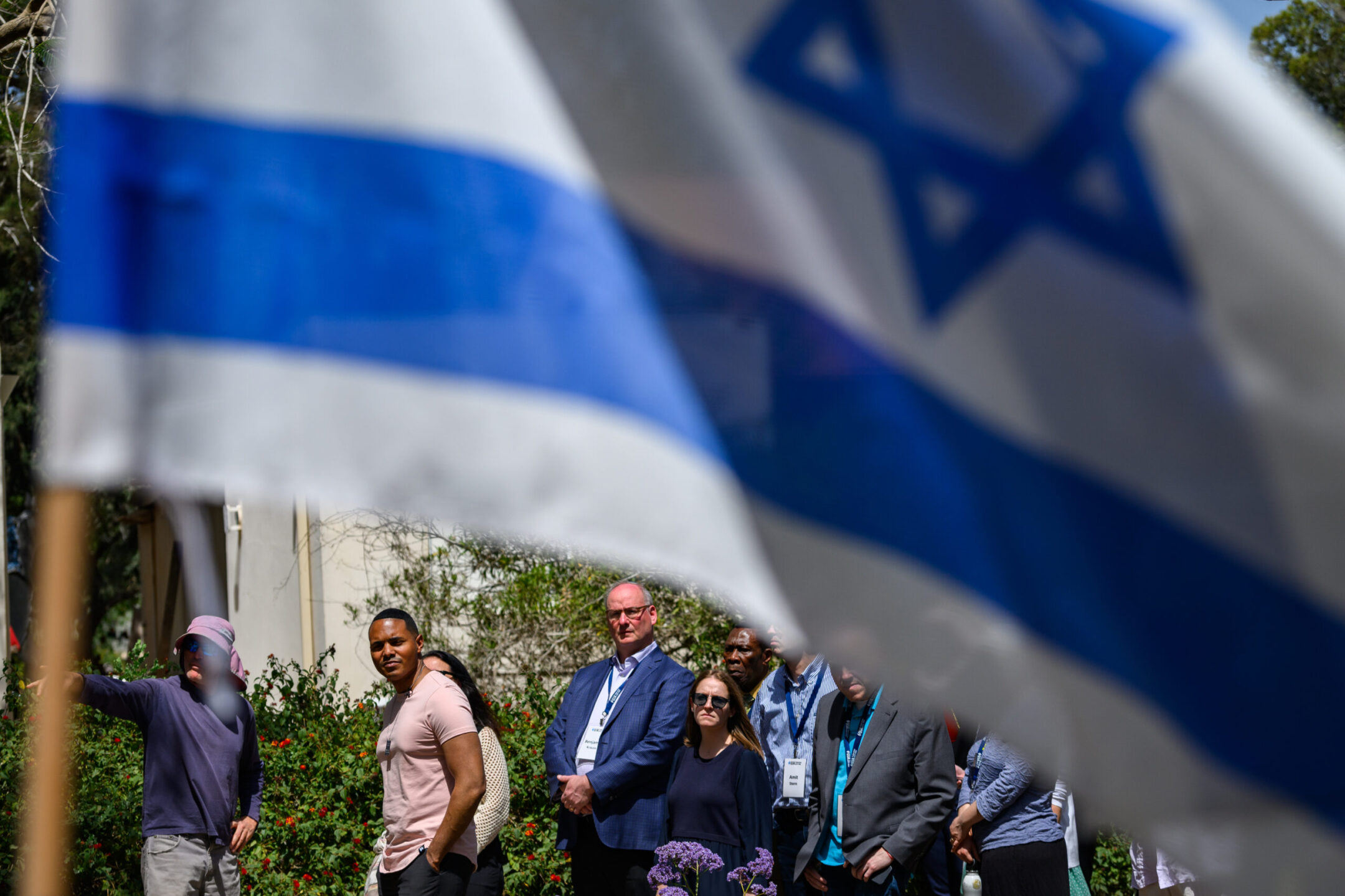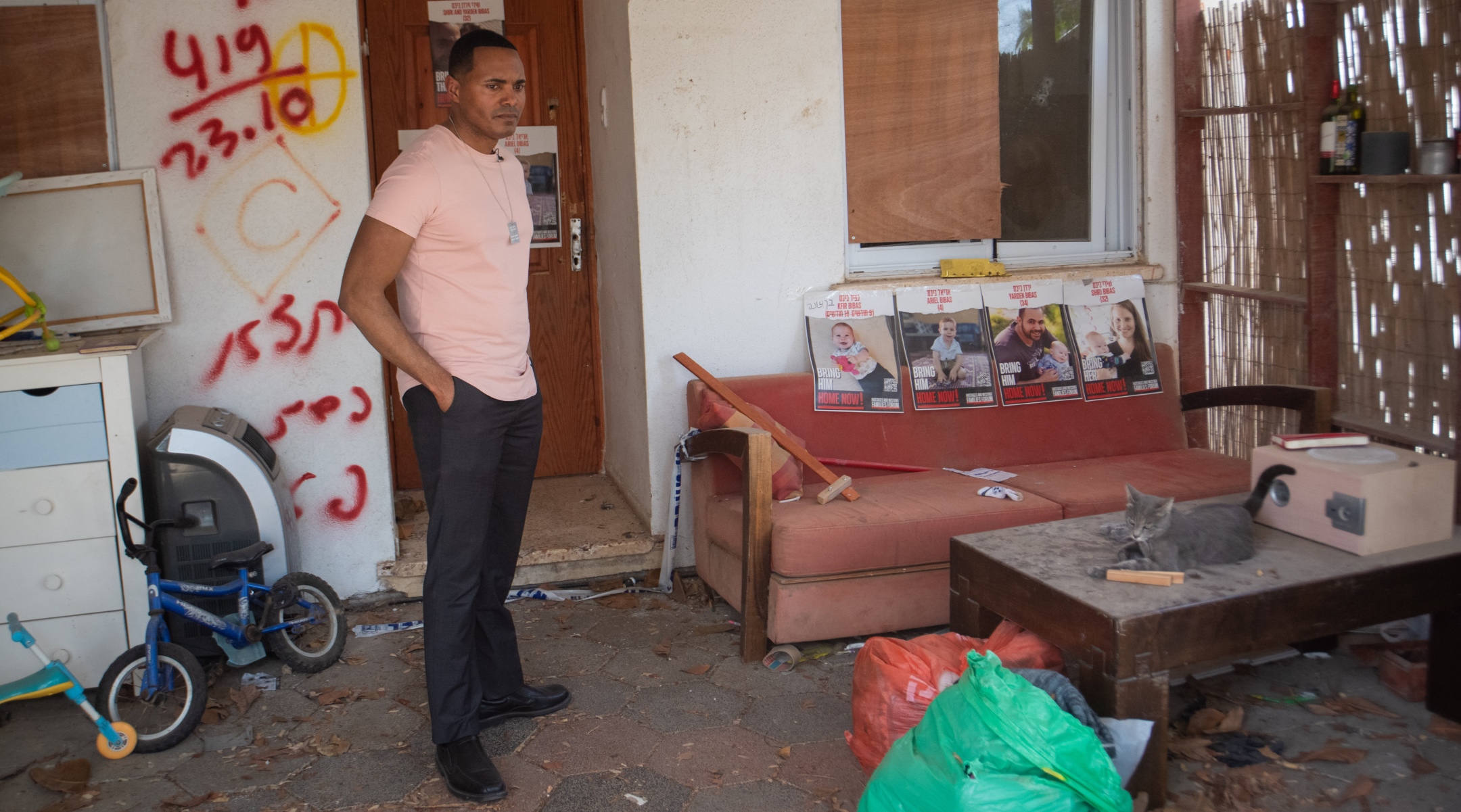(New York Jewish Week) — Last week, a video circulated online that drew impassioned commentary from Ritchie Torres’ supporters and opponents alike.
In the two-minute clip, shared on April 4, the Bronx congressman parries accusations from pro-Palestinian activists that he supports the starvation of children during a genocide in Gaza. In response, he denies that Israel is committing genocide and blames the humanitarian crisis in Gaza on Hamas stealing aid meant for civilians. Both arguments hew closely to the Israeli government line.
A pro-Israel activist called Torres a “king” for how he responded to the activists. An opponent wrote, “Torres lies, people die!”
But for Torres himself, the exchange was a sharp turn from the reception he got two days earlier, when he wrapped up a three-day trip to Israel. There, he told the New York Jewish Week, he was treated like a celebrity.
“It’s unusual for me to have people ask for my autograph without mistaking me, without thinking that I’m someone other than myself,” he said. He’s been mistaken in the past for Trevor Noah, the former “Daily Show” host.
“I went into Israel thinking that I had no name recognition,” he said. “But I had a little more than I thought.”
That positivity reflects the increasingly unpopular position Torres has carved out for himself in the six months since Oct. 7. In the weeks after Hamas’ invasion, nearly every official on Capitol Hill expressed support for Israel. Now, criticism of its war effort has mounted among Democrats, and Torres is one of a shrinking number of lawmakers in the party who remains a staunch backer of Israel’s actions, and often of its government’s talking points.
Torres’ support for Israel has made him one of the biggest recipients of funds from AIPAC and other pro-Israel groups. But he also said he suffers near constant opprobrium for that position. On Christmas, activists left a bloody baby doll outside his office. It was meant to represent Jesus as a Palestinian.
“The escalation in intimidation and incitement against Members of Congress feels like it is heading in a dangerous direction,” he wrote in response on X, the platform formerly known as Twitter. “I, for one, will not be intimidated.”
Sometimes the tension strikes close to home — very close. He said he was “no longer on speaking terms” with a close relative whom he asked the New York Jewish Week not to identify over his positions on Israel.
His mood — at least according to photos sent out by his office — was different in Israel, where he looked relaxed and happy. After returning from the trip, he praised Israelis as “resilient” and the country as “inspiring.” He said the world is suffering “amnesia” about Hamas’ Oct. 7 attack on Israel, which killed some 1,200 people and took approximately 250 hostage.
“Imagine personally knowing nearly half of the more than 200 hostages abducted on October 7th—a scale of trauma that most of us cannot fathom,” he wrote on X on the day after he came back from the trip, which was sponsored by the UJA-Federation of New York. “These are but a few of the stories I heard while experiencing Israel for the first time since October 7th. #NeverForget.”

Rep. Ritchie Torres along with a delegation from the Bronx visits Israel’s Kibbutz Nir Oz, April 1, 2024. (Alexi J. Rosenfeld/Getty Images)
A centerpiece of Torres’ trip was a visit to Kibbutz Nir Oz, which remains largely in rubble after dozens of residents were killed or taken hostage on Oct. 7. But those traveling with him said that throughout the trip, Torres encountered honor as well as horror: He was unable to take a late- night stroll, they said, without being stopped.
Bini Krauss, the principal of the Orthodox SAR Academy, in Riverdale, described the scene on the final night at the Western Wall, where both joined a memorial service for former Sen. Joe Lieberman, who had just died. Israeli soldiers and others praying at the Wall noticed Torres and surrounded him.
“He is definitely a hero in the Israeli community, the Jewish community,” said Krauss, who has hosted Torres at his school since Oct. 7.
On issues beyond Israel, Torres is considered a progressive, though tensions over the Gaza war led him to leave the Congressional Progressive Caucus earlier this year. He declined to comment on that change, though he said that many of his progressive colleagues agree with him to varying degrees on Israel. And core support for Israel in Congress, at least judging by voting records, appears quite high. In November, the House passed a motion reaffirming the country’s right to exist by a vote of 412-1.
Since then, criticism of Israel’s campaign in Gaza has grown as its death toll has passed 32,000, coming even from some of the country’s staunchest American supporters. And Torres said the state of public discourse on Israel — where he encounters “nothing but criticism, hyperbolic and hysterical demonization of Israel, on social media and in the mainstream media” — cows his fellow progressives into silence.
“There’s no issue on which I get more hate, harassment and death threats than on the subject of Israel,” he said. “My office has been flooded with hate calls. There’s a concerted effort to intimidate elected officials like me from supporting Israel. And there are elected officials who allow themselves to be browbeaten into silence and submission.”
Arthur Richardson, a Democratic club leader in the Bronx, said he admired how Torres endured flack for his Israel positions. Torres, Richardson said, “has stood firm, in spite of all of the backlash that he’s received, and he has received many.”
Torres has had a reputation for bucking party politics since he was elected in 2013 to the New York City Council, said Mark Treyger, the CEO of the New York Jewish Community Relations Council, who joined the trip.
“He’s not in this field to make friends,” said Treyger, who served alongside Torres on the city council. He recalled Torres’ relentless — and ultimately successful — advocacy for aid to residents hit hard by Superstorm Sandy. “One thing I could tell you about those hearings that we had about public housing, is how many enemies he made in the [Bill de Blasio] administration.”

(L-R) Congressman Ritchie Torres, Rabbi Binyamin Krauss and Israeli Consul General Aviv Ezra take questions from a group SAR Academy students, Dec. 22, 2023. (Julia Gergely)
Until recently, Torres was more or less aligned with President Joe Biden, who embraced Israel after Oct. 7. Of late, he’s begun to criticize the president for allowing a United Nations Security Council resolution calling for a ceasefire, and for statements blasting Israel for the killing last week of seven humanitarian aid workers.
“Overall the president has been fundamentally supportive of Israel,” he said. “Now, having said that, I do respectfully disagree with the president’s decision to abstain from the U.N. Security Council resolution. And I disagreed with a number of statements that have been made. I thought some of them were too harsh a tone.”
Some of those criticisms echo talking points more commonly found on the right. Torres is concerned, for example, that the resolution did not link a ceasefire to the release of the more than 130 hostages who remain captive. He said he’s concerned that the resolution “gives Hamas enhanced leverage” — the key argument of Israeli Prime Minister Benjamin Netanyahu.
One topic he won’t touch is New York Sen. Chuck Schumer’s call last month for new elections in Israel. The Democrat, who as majority leader is the most senior Jewish elected official in U.S. history, rattled U.S.-Israel ties with the speech, which also expressed support for Israel and castigated Hamas.
“If you are neither Israeli nor Jewish, like myself, you have no right to weigh in on Israeli domestic politics,” Torres said, adding that Schumer has been a mentor. “The question of whether an American Jew has the right to weigh in on Israeli domestic politics strikes me as an ongoing debate within the Jewish community. And I feel like it’s not my place to comment on the debate, I have no right to be part of that debate.”
He is ready to soak up the Israeli love, though, and to dish it back. While on his trip, he slipped on “Bring them home” T-shirts family members gave him and sported a dog tag given to him by a survivor of the Nova music festival massacre, which bore the phrase “We will dance again.”
“I feel like those words, ‘We will dance again,’ powerfully capture resilience that’s so deeply encoded in the Israeli DNA,” he said. “I left Israel more inspired than depressed.”
Richardson joked that Torres may get too inspired. He said, “You know, to be there with him and to see the respect and the love that he received from the people of Israel — the only thing that worries me is, I told him, ‘Don’t move to Israel and go to the Knesset and leave us alone up here.’”
The New York Jewish Week brings you the stories behind the headlines, keeping you connected to Jewish life in New York. Help sustain the reporting you trust by donating today.





